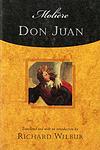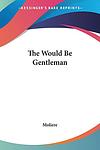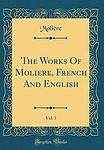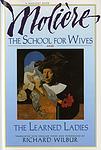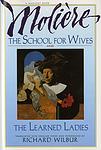Molière
Molière, born Jean-Baptiste Poquelin on January 15, 1622, was a renowned French playwright, actor, and poet, widely regarded as one of the greatest writers in the French language and world literature. He is known for his satirical plays that critiqued the social and religious norms of his time. Some of his most famous works include 'The Misanthrope,' 'The School for Wives,' 'Tartuffe,' 'The Imaginary Invalid,' and 'The Bourgeois Gentleman.' His works are still performed today and have had a lasting impact on French theater and comedy. Molière died on February 17, 1673.
Books
This list of books are ONLY the books that have been ranked on the lists that are aggregated on this site. This is not a comprehensive list of all books by this author.
-
1. Tartuffe
This classic French play revolves around the character Tartuffe, a hypocritical and cunning man who pretends to be deeply pious and religious. He manages to deceive Orgon, a wealthy family patriarch, into believing in his piety. Orgon is so taken in by Tartuffe that he decides to marry him off to his daughter, despite her love for another man. The family works together to expose Tartuffe's true nature, leading to a series of comic and dramatic events. The play is a satirical critique of religious hypocrisy and gullibility.
-
2. The Misanthrope
"The Misanthrope" is a satirical play that explores the hypocrisy and corruption of French aristocratic society through the eyes of the protagonist, a man who insists on absolute honesty and despises flattery, insincerity, and social conventions. Despite his disdain for society, he falls in love with a coquette who embodies everything he detests, leading to a series of comedic and dramatic situations. The narrative ultimately emphasizes the importance of balance between truth and courtesy in social interactions.
-
3. The Imaginary Invalid
The play is a satirical comedy that centers around Argan, a hypochondriac who obsesses over his health and squanders his fortune on unnecessary medical treatments. His ailment is exploited by charlatan doctors and a greedy wife, while his daughter's marital future hangs in the balance due to his misguided intentions. The story unfolds with a clever servant, Toinette, and Argan's brother, Béralde, attempting to open his eyes to the truth of his condition and the deceit around him. Through a series of humorous events, including a mock ceremony, the play critiques the medical profession and the foolishness of those who blindly follow it, ultimately advocating for common sense and true familial love.
-
4. Don Juan
This comedic play explores the life of a libertine nobleman who is infamous for his seduction of women. The protagonist is a man who lives by his own rules, unburdened by morality or religion, and who takes pleasure in manipulating others for his own gain. His actions eventually lead to his downfall when he refuses to repent for his sins, resulting in a dramatic, supernatural punishment.
-
5. The Would-Be Gentleman
This comedic play revolves around a middle-class man who aspires to elevate his social status and become a gentleman. He hires teachers to educate him in the arts, language, and manners of the upper class, but his lack of understanding and pretentious behavior only makes him look foolish. His obsession with his newly acquired 'gentleman' status strains his relationship with his sensible wife and daughter, and leads to a series of humorous and satirical incidents that mock the pretensions and hypocrisy of the society.
-
6. The Miser
"The Miser" is a comedic play that revolves around a wealthy man who is so obsessed with his money that he neglects his own children. His son and daughter, both in love with people they cannot afford to marry due to their father's stinginess, scheme to trick him out of his wealth. The play satirizes the greed and hypocrisy of the upper class, while exploring themes of love, deception, and the value of money.
-
7. The Works of Moliere
This book is a compilation of the works of a renowned 17th-century French playwright, who is often considered one of the greatest masters of comedy in Western literature. His plays are known for their satirical examination of social norms and human folly, featuring a range of characters from the foolish and the pedantic to the hypocritical and the corrupt. Some of his most famous works included in this collection are "Tartuffe," "The Misanthrope," and "The Imaginary Invalid."
-
8. The School for Wives
"The School for Wives" is a comedic play about a man who attempts to groom a young woman to be his perfect, obedient wife. However, his plans are thwarted when the young woman falls in love with another man. The play satirizes societal norms around marriage, highlighting the absurdity of controlling relationships and the importance of love and mutual respect.
-
9. The Learned Ladies
The play is a satirical comedy that delves into the pretensions and affectations of intellectualism and pedantry among the bourgeois class. It centers around the conflict within a family over the value of genuine learning and the superficial appearance of being cultured. The plot revolves around two young lovers whose marriage is opposed by the mother, who is under the influence of a pseudo-intellectual poet. The mother wishes her daughter to marry this pedantic man instead, valuing his ostentatious display of knowledge over genuine wisdom and love. The play mocks the absurdities of academic snobbery and the misplaced priorities of those who value the appearance of intelligence over true understanding and happiness.
-
10. School For Husbands
"School for Husbands" is a comedic play that delves into the themes of love, marriage, and the contrasting approaches to spousal control. The narrative centers around two brothers with opposing views on how to treat their respective wards, whom they intend to marry. The older brother advocates for strictness and authority, keeping a tight rein on his young ward, while the younger brother espouses freedom and trust in his own. As the story unfolds, the characters engage in a series of humorous and revealing situations that challenge their beliefs about relationships and ultimately lead to a conclusion that favors liberality over rigidity, suggesting that love cannot be forced or controlled, but rather should be nurtured with understanding and freedom.
-
11. Ridiculous Precieuses
The play is a satirical comedy that pokes fun at the pretentiousness and affectations of the intellectual and social elite of the time. It centers around two young men who, in their pursuit of love, find themselves entangled with a group of affected women who are obsessed with the finer points of literary and social etiquette. The men must navigate through the absurdities of these self-proclaimed "precieuses" (precious ones), whose ludicrous behavior and exaggerated mannerisms are both mocked and exposed as ridiculous. The work is a humorous critique of the artificialities of certain social circles and the lengths to which people will go to appear more sophisticated than they truly are.



